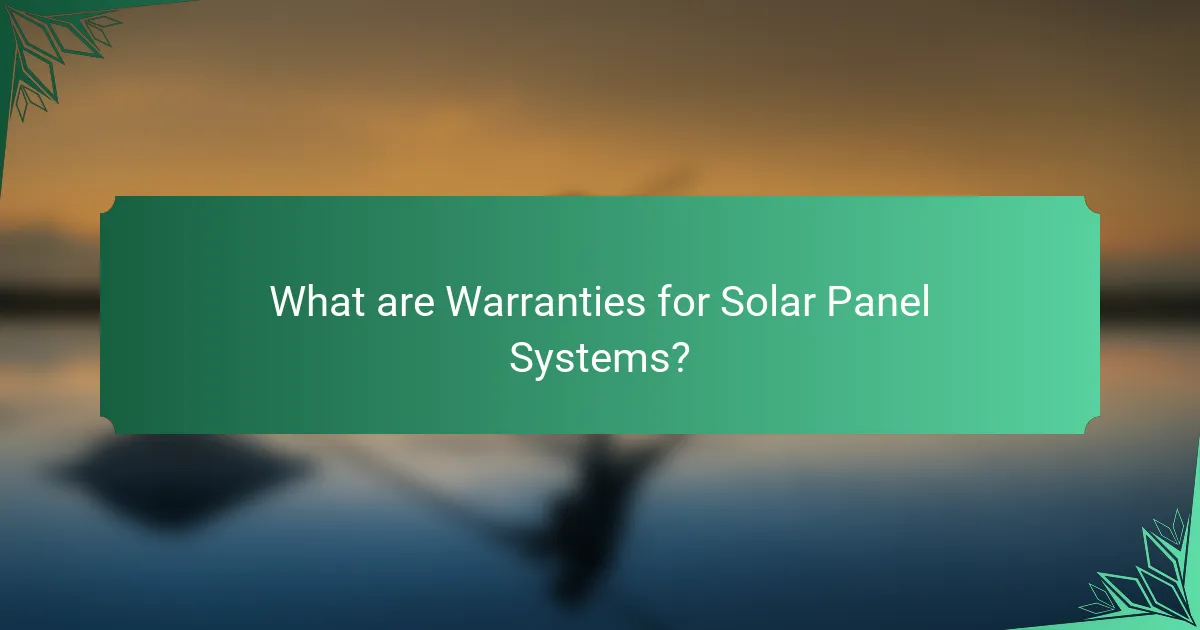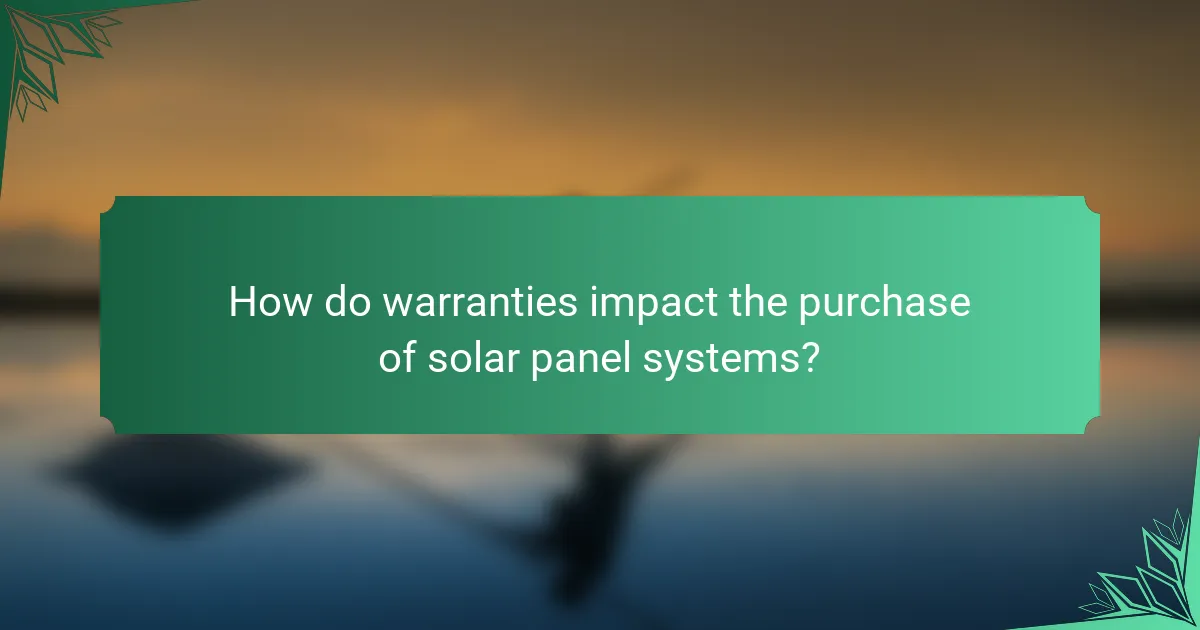
What are Warranties for Solar Panel Systems?
Warranties for solar panel systems are guarantees provided by manufacturers regarding the performance and longevity of their products. These warranties typically cover two main aspects: product defects and performance efficiency. Product warranties usually last between 10 to 25 years, ensuring that the panels will be free from defects in materials and workmanship. Performance warranties often guarantee that the panels will produce a certain percentage of their rated power output for a specified duration, commonly 25 years. For example, a performance warranty may guarantee that the panels will still produce at least 80% of their rated output after 25 years. These warranties provide consumers with assurance regarding the reliability and efficiency of their solar investment.
Why are warranties important for solar panel systems?
Warranties are crucial for solar panel systems because they provide protection against defects and performance issues. A warranty typically covers the panels for 25 years, ensuring they maintain a certain efficiency level. This long duration reflects the expected lifespan of solar panels. If the panels fail to perform as promised, the warranty offers repair or replacement at no additional cost. This financial security encourages consumers to invest in solar technology. According to the National Renewable Energy Laboratory, warranties can significantly enhance consumer confidence in renewable energy systems. Thus, warranties play a vital role in the adoption and reliability of solar panel systems.
What types of warranties are available for solar panel systems?
There are three main types of warranties available for solar panel systems: product warranties, performance warranties, and installation warranties. Product warranties cover defects in materials and workmanship. They typically last between 10 to 25 years. Performance warranties guarantee a certain level of energy production over time. These usually span 25 years and ensure panels maintain at least 80% efficiency. Installation warranties cover the work done by the installer. They vary in duration, often lasting from 1 to 10 years. Each warranty type provides essential protection and peace of mind for solar panel system owners.
How do warranties protect solar panel system owners?
Warranties protect solar panel system owners by guaranteeing the performance and reliability of their investment. They typically cover defects in materials and workmanship for a specified period, often ranging from 10 to 25 years. If a solar panel fails or underperforms, the warranty allows owners to receive repairs or replacements at no additional cost.
Additionally, warranties may cover the inverter and other system components, ensuring comprehensive protection. Many manufacturers provide performance guarantees, promising a certain level of energy production over time. This assurance helps owners avoid unexpected costs associated with system failures.
Research shows that warranties can significantly enhance the resale value of solar panel systems. A study by the National Renewable Energy Laboratory found that homes with solar systems that include robust warranties sell for more than those without. Thus, warranties not only protect current owners but also add value for future transactions.
What are the common components covered by solar panel warranties?
Solar panel warranties typically cover three main components: product defects, performance guarantees, and workmanship. Product defects ensure that the solar panels will function as intended without manufacturing flaws. Performance guarantees specify that the panels will produce a certain amount of energy over a defined period. Workmanship coverage protects against installation errors that may affect the system’s performance. These components are crucial for maintaining the efficiency and longevity of solar energy systems.
What is included in the product warranty for solar panels?
A product warranty for solar panels typically includes coverage for defects in materials and workmanship. This warranty usually lasts between 10 to 25 years, depending on the manufacturer. It guarantees that the panels will perform at a specified efficiency level over a certain period. For instance, many warranties promise at least 80% efficiency after 25 years. Additionally, the warranty may cover the cost of repairs or replacements if the panels fail due to manufacturing defects. Some warranties also include provisions for labor costs associated with installation or replacement. It is crucial for consumers to review the specific terms of the warranty, as they can vary significantly between manufacturers.
What does the performance warranty guarantee?
The performance warranty guarantees that a solar panel will produce a specified amount of electricity over a defined period. Typically, this warranty lasts between 25 to 30 years. It ensures that the panels will maintain a certain efficiency level, often around 80% to 90% of their original capacity by the end of the warranty period. Manufacturers provide this warranty to assure customers of the long-term reliability and output of their solar systems. This guarantee reflects the expected performance based on testing and historical data. Such warranties are critical for consumer confidence in solar investments.

How do warranties impact the purchase of solar panel systems?
Warranties significantly influence the purchase of solar panel systems. They provide assurance regarding the product’s longevity and reliability. A strong warranty can enhance consumer confidence in the investment. Typically, warranties cover performance and equipment defects. For instance, many manufacturers offer 25-year performance warranties. This duration indicates the expected lifespan of the solar panels. Consumers often prefer systems with robust warranty terms. Research shows that buyers are more likely to choose brands with longer warranties. This trend reflects the perceived value and trust in the product. Overall, warranties play a crucial role in the decision-making process for solar panel purchases.
What factors should consumers consider when evaluating warranties?
Consumers should consider several factors when evaluating warranties for solar panel systems. The duration of the warranty is crucial, as longer warranties often indicate manufacturer confidence. Coverage details are also important; consumers should understand what is included and excluded. The warranty should specify performance guarantees, ensuring panels meet efficiency standards over time. Transferability is another factor; warranties that are transferable can enhance resale value. Additionally, the claims process should be clear and straightforward. Consumers should also check the reputation of the manufacturer, as established brands may offer more reliable support. Lastly, any limitations or conditions attached to the warranty should be carefully reviewed.
How do warranty terms vary among different manufacturers?
Warranty terms vary significantly among different manufacturers of solar panel systems. Some manufacturers offer warranties ranging from 10 to 25 years. The duration often reflects the manufacturer’s confidence in their product’s longevity. Additionally, the coverage can differ. Some warranties cover only defects in materials or workmanship, while others include performance guarantees. Performance warranties typically ensure that the panels will produce a certain percentage of their rated capacity over time.
Moreover, the conditions for warranty claims can vary widely. Some manufacturers require regular maintenance records, while others may not. Additionally, the transferability of warranties can differ; some manufacturers allow warranties to be transferred to new owners, while others do not. This variability underscores the importance of reviewing warranty terms before purchasing solar panels.
What are the implications of warranty exclusions?
Warranty exclusions limit the protection offered to consumers. They specify conditions under which the warranty is voided. Common exclusions include damage from improper installation or maintenance. This means consumers may face unexpected repair costs. Warranty exclusions can also affect resale value. Buyers may be wary of systems with limited warranty coverage. Understanding these exclusions is crucial for informed purchasing decisions. Consumers should carefully review warranty terms before buying solar panel systems.
How can warranties influence long-term savings on solar panel systems?
Warranties can significantly influence long-term savings on solar panel systems by providing financial protection against defects and performance issues. A good warranty typically covers repairs or replacements for a specified duration. This coverage reduces unexpected costs associated with system failures. For example, a 25-year warranty can safeguard against declining efficiency over time. Studies show that solar panels with longer warranties tend to have better performance. Homeowners can save money on maintenance and repairs, enhancing overall savings. Additionally, warranties can increase property value by assuring potential buyers of system reliability. Thus, warranties play a crucial role in maximizing the financial benefits of solar panel investments.
What potential costs can be mitigated by having a warranty?
Warranties can mitigate several potential costs associated with solar panel systems. These include repair costs for defective components. If a solar panel fails, the warranty often covers replacement or repair expenses. This can save homeowners thousands of dollars.
Additionally, warranties can reduce maintenance costs. Regular maintenance may be required to keep the system functioning optimally. Warranties can cover certain maintenance services, lowering overall expenses.
Moreover, warranties can protect against performance issues. If the system does not meet specified energy production levels, warranties may provide compensation or replacement. This ensures that homeowners receive the expected return on investment.
Lastly, warranties can shield against installation errors. If the installation is faulty, warranties often cover the costs of rectification. This can prevent significant financial losses in the long run.
How does warranty coverage affect the resale value of solar panel systems?
Warranty coverage positively affects the resale value of solar panel systems. A strong warranty indicates reliability and quality to potential buyers. Buyers often prefer systems with longer warranty periods. This preference can lead to a higher asking price. According to a study by the National Renewable Energy Laboratory, systems with robust warranties can sell for up to 20% more. Warranty coverage also reduces perceived risk for buyers. Enhanced resale value is a crucial consideration for sellers. Thus, warranty coverage is a key factor in determining resale value.

What are the best practices for managing solar panel warranties?
To manage solar panel warranties effectively, keep organized records of all warranty documents. This includes installation paperwork, purchase receipts, and warranty terms. Regularly review the warranty coverage to understand specific conditions and limitations. Schedule routine maintenance checks to ensure compliance with warranty requirements. Document any maintenance or repairs performed on the solar panel system. Promptly report any issues to the manufacturer or installer as soon as they arise. Follow the manufacturer’s guidelines for claims to avoid potential disputes. Lastly, stay informed about any changes to warranty policies from the manufacturer. These practices help maximize the benefits of solar panel warranties and protect your investment.
How can consumers ensure they maximize their warranty benefits?
Consumers can maximize their warranty benefits by understanding the terms and conditions of their solar panel warranties. They should read the warranty documentation thoroughly to know what is covered and for how long. Regular maintenance of the solar panel system is essential to ensure it remains in good working condition. Keeping records of all maintenance and repairs can help when filing a warranty claim. Consumers should also register their warranty with the manufacturer promptly after installation. This registration often activates the warranty and ensures they receive notifications about any updates or recalls. Lastly, contacting customer service for clarification on any warranty-related questions can help consumers fully utilize their benefits.
What steps should be taken to maintain warranty coverage?
To maintain warranty coverage for solar panel systems, follow specific steps. First, ensure proper installation by qualified professionals. This guarantees compliance with manufacturer guidelines. Second, conduct regular maintenance as recommended by the manufacturer. Scheduled inspections help identify potential issues early. Third, keep all purchase and maintenance documentation organized. This includes receipts and service records. Fourth, avoid unauthorized modifications or repairs. Such actions can void the warranty. Lastly, register the warranty with the manufacturer promptly. This step is crucial for warranty validation. Following these steps helps protect your investment in solar panel systems.
How can consumers document warranty claims effectively?
Consumers can document warranty claims effectively by keeping detailed records of their purchase and any related communications. This includes saving receipts, warranty documents, and installation records. Consumers should also take photographs of the product and any issues encountered. Documenting dates of contact with the manufacturer or retailer is crucial. Keeping notes of conversations, including names and titles of representatives, adds credibility. Consumers should compile all related documentation into a single file for easy access. This organized approach helps streamline the claims process. According to a study by Consumer Reports, proper documentation can significantly increase the likelihood of a successful warranty claim.
What common challenges do consumers face with solar panel warranties?
Consumers face several common challenges with solar panel warranties. One challenge is understanding the warranty terms. Many consumers find the language complex and difficult to interpret. Another challenge is the duration of coverage. Some warranties may only last 10 to 25 years, which can be confusing for consumers. Additionally, consumers often encounter limitations on coverage. Certain damages or performance issues may not be covered. Another issue is the claims process, which can be lengthy and complicated. Consumers may also struggle with finding qualified service providers to honor the warranty. Lastly, there can be discrepancies between manufacturer and installer warranties, leading to confusion about responsibility. These challenges can affect consumer confidence in their solar panel investments.
What are the most frequent reasons for warranty claim denials?
The most frequent reasons for warranty claim denials include lack of proper documentation, misuse of the product, and failure to adhere to maintenance guidelines. Many claims are denied due to insufficient proof of purchase or installation. Misuse refers to operating the solar panel system outside its intended parameters. Additionally, not following manufacturer maintenance recommendations can lead to voided warranties. According to industry reports, around 30% of warranty claims are denied for these reasons. This highlights the importance of understanding warranty terms and conditions.
How can consumers navigate disputes with warranty providers?
Consumers can navigate disputes with warranty providers by first reviewing the warranty terms. Understanding the coverage, exclusions, and claim process is essential. Document all communications with the warranty provider. Keep records of emails, phone calls, and letters. If a dispute arises, gather evidence such as receipts and photographs of the issue. Contact the warranty provider to formally present your case. Be clear and concise in your explanation. If the issue remains unresolved, escalate the matter to a supervisor or a consumer protection agency. Research local laws regarding warranties for additional support. Following these steps can help consumers effectively address disputes with warranty providers.
What tips can help consumers choose the right warranty for their solar panel system?
Consumers should compare warranty lengths for solar panel systems. A longer warranty often indicates higher quality. Look for warranties that cover both product and performance. Ensure the warranty includes coverage for labor costs. Read the fine print regarding exclusions and limitations. Verify if the warranty is transferable if you sell your home. Check the reputation of the manufacturer regarding warranty claims. Research customer reviews to gauge satisfaction with warranty service.
Warranties for solar panel systems are essential guarantees provided by manufacturers that ensure the performance and longevity of solar products. This article covers the significance of these warranties, detailing the types available, including product, performance, and installation warranties, and their role in protecting consumers against defects and performance issues. Additionally, it discusses how warranties can influence consumer confidence, resale value, and long-term savings, while also addressing common challenges and tips for effectively managing warranty claims. Understanding the intricacies of solar panel warranties is crucial for maximizing the benefits of solar investments.